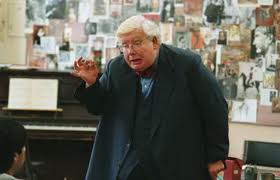Let me start by saying, I am a fan of Tony Wagner. I follow him on twitter, and I read and enjoyed his The Global Achievement Gap. He is a wise man who makes many good observations about education, but continually I have balked at his theory that owning knowledge is increasingly less important in the digital age. Recently, in a op-ed for the New York Times. Thomas Friedman quoted him as saying:
“Because knowledge is available on every Internet-connected device, what you know matters far less than what you can do with what you know.
This sentiment is echoed throughout the modern dialog about education and exemplified in the new common core standards currently driving public school reform. Consider this quote from The Innovation Unit:
Now that many mobile phones can access more information than is held in any library, the idea of school as the place you go to acquire knowledge is an anachronism.
Perhaps it is because I am at heart an English teacher or maybe it is just my own education, but to me the idea that we no longer need to own knowledge because we can always google the answer to any question is depriving education and, for that matter educators and students, of soul. Of course developing 21st century skills is a vital and central part of education today, but the seeming acceptance that schools are not a place where students acquire knowledge both for its own sake and for their own edification as human beings is detrimental to the entire educational process and to our students.
Luckily, although my school is determined to educate students for the 21st century and impart 21st century skills, we have not moved away from the belief that the students do actually need to own knowledge. We are not forced simply to show children how to use the mountains of information at their finger tips. I am allowed and encouraged to turn kids on to books, words, and histories that will inform their being and to hold them accountable for the knowledge we impart in our courses. While analysis is key and central, students are expected to leave our class knowing basic civics including the bill of rights, the separation of powers, a few poems by heart, and the basic trajectory of all of American History. We hope they leave with more, but our goal is to make them active, curious and engaged citizens. To become engaged citizens, they must possess more than a device to access knowledge. They must own knowledge itself.
As Hector, the incredibly flawed yet idealistic old school teacher from Alan Bennett’s The History Boys who believes in knowledge for its own sake, articulates:
The best moments in reading are when you come across something — a thought, a feeling, a way of looking at things — that you’d thought special, particular to you. And here it is, set down by someone else, a person you’ve never met, maybe even someone long dead. And it’s as if a hand has come out and taken yours.
You can’t google that experience, and you can’t duplicate it by looking it up. You have to experience it, and you have to have teachers who help you acquire to knowledge to access that skill, that level of empathy. How can one truly know and love a poem if he/she can’t recall from memory two or three lines? How can you understand history if you don’t know some major dates and ideas without turning to wikipedia?
Another great moment in the play comes when one of the students expresses his hatred for poetry. Hector explains that what he is teaching these boys isn’t for any test. He tells them “to learn it now, know it now and you’ll understand it whenever” they need it. They are, according to Hector, “making their deathbeds.” It is because education is about so much more than test preparation and 21st century skills. It is about preparing for a life of meaning, and I do not think any student now matter how good their 21st century skills are can find that on a search engine.
So on this point, I have to respectfully disagree with Tony Wagner and his echoes. Students do need more than just schools that teach 21st century skills. They need schools to be places where they acquire knowledge. They need help “making their deathbeds” and preparing for a life of meaning.

Pingback: Patue » Patue Blog Roll
Knowledge that we own helps us to solve problems and accomplish tasks more quickly than if we had to Google it all. It also is pretty essential in making connections which lead to new ideas and thoughts.
Pingback: Teaching in a 2.0 World: Why Tech Matters, but not as much as some would make us believe. | What Teachers Make